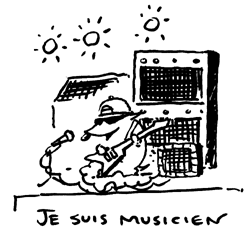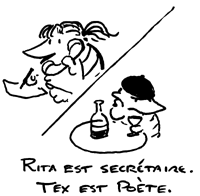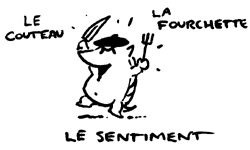1 – Bonjour et bienvenue!
Grammaire: Le genre grammatical
Grammatical gender
In French, a noun always has a grammatical gender; it is always either feminine or masculine. It is introduced by a determiner, which usually indicates the gender of the noun.
1. People
When a noun refers to a person, the gender is usually determined by the person’s sex (although some exceptions do exist).
In general, the feminine form of the noun is produced by adding an –e to the masculine noun. Note that the addition of the –e changes the pronunciation in some words:
| Joe-Bob est étudiant, Tammy est aussi étudiante. | Joe-Bob is a student, Tammy is a student |
| Tex est ami avec Joe-Bob, Tammy est aussi amie avec Joe-Bob. | Tex is Joe-Bob’s friend, Tammy is also Joe-Bob’s friend. |
There are cases when the feminine form of the noun changes more drastically.
| Edouard: Je suis serveur. Tammy: Je ne suis pas serveuse. |
Edouard: I’m a waiter. Tammy: I’m not a waiter. |
| Trey: Je suis musicien. Tammy: Je ne suis pas musicienne. |
Trey: I’m a musician. Tammy: I’m not a musician. |

In general, when the masculine noun ends in -e, the feminine noun remains unchanged. In this case, either the determiner or the context indicates if it is a feminine or masculine noun.
| Tex est poète. Rita n’est pas poète.
Rita est secrétaire. Tex n’est pas secrétaire. |
Tex is a poet. Rita is not a poet.
Rita is a secretary. Tex is not a secretary. |

2. Objects and ideas
The gender of nouns referring to things and abstractions is arbitrary. This means that there is no rhyme or reason as to why “une table,” for example, is feminine and not masculine, or why “un livre” is masculine and not feminine; it is simply a matter of convention. In spite of the arbitrary nature of grammatical gender, one can often infer the gender of a word from its ending .
Typically, words ending in –age, –ment, –eau, –phone, –scope, –isme are masculine.
Words ending in –tion, –sion, –té, –ette, –ance, –ence, –ie, –ure, –ode, –ade, –ude are feminine.

| masculine endings | feminine endings |
| le fromage (cheese) | la salade (salad, lettuce) |
| le monument (monument) | la fourchette (fork) |
| le sentiment (feeling) | la télévision (television) |
| le couteau (knife) | la culture (culture) |
| le téléphone (telephone) | la situation (situation) |
| le microscope (microscope) | la société (society) |
| le romantisme (romanticism) | la différence (difference) |
| la philosophie (philosophy) |
3. Test your knowledge
Which gender do these endings have?

